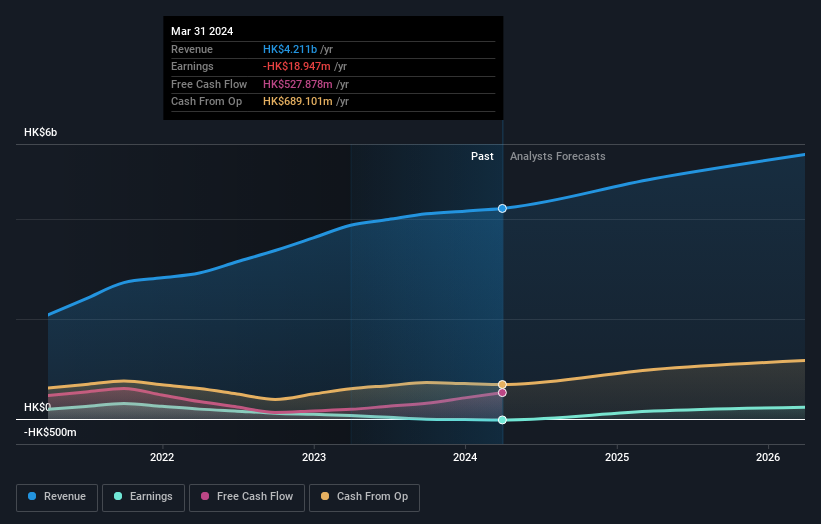- Hong Kong
- /
- Consumer Services
- /
- SEHK:2138
EC Healthcare's (HKG:2138): Top Key Executive Chi Fai Tang is the most bullish insider, and their stock value gained 35% last week

Key Insights
- Insiders appear to have a vested interest in EC Healthcare's growth, as seen by their sizeable ownership
- Chi Fai Tang owns 61% of the company
- Institutions own 10% of EC Healthcare
A look at the shareholders of EC Healthcare (HKG:2138) can tell us which group is most powerful. We can see that individual insiders own the lion's share in the company with 61% ownership. That is, the group stands to benefit the most if the stock rises (or lose the most if there is a downturn).
As a result, insiders scored the highest last week as the company hit HK$1.3b market cap following a 35% gain in the stock.
In the chart below, we zoom in on the different ownership groups of EC Healthcare.
See our latest analysis for EC Healthcare

What Does The Institutional Ownership Tell Us About EC Healthcare?
Institutions typically measure themselves against a benchmark when reporting to their own investors, so they often become more enthusiastic about a stock once it's included in a major index. We would expect most companies to have some institutions on the register, especially if they are growing.
EC Healthcare already has institutions on the share registry. Indeed, they own a respectable stake in the company. This implies the analysts working for those institutions have looked at the stock and they like it. But just like anyone else, they could be wrong. When multiple institutions own a stock, there's always a risk that they are in a 'crowded trade'. When such a trade goes wrong, multiple parties may compete to sell stock fast. This risk is higher in a company without a history of growth. You can see EC Healthcare's historic earnings and revenue below, but keep in mind there's always more to the story.

EC Healthcare is not owned by hedge funds. Our data suggests that Chi Fai Tang, who is also the company's Top Key Executive, holds the most number of shares at 61%. When an insider holds a sizeable amount of a company's stock, investors consider it as a positive sign because it suggests that insiders are willing to have their wealth tied up in the future of the company. In comparison, the second and third largest shareholders hold about 4.8% and 1.7% of the stock.
Researching institutional ownership is a good way to gauge and filter a stock's expected performance. The same can be achieved by studying analyst sentiments. While there is some analyst coverage, the company is probably not widely covered. So it could gain more attention, down the track.
Insider Ownership Of EC Healthcare
The definition of company insiders can be subjective and does vary between jurisdictions. Our data reflects individual insiders, capturing board members at the very least. The company management answer to the board and the latter should represent the interests of shareholders. Notably, sometimes top-level managers are on the board themselves.
Most consider insider ownership a positive because it can indicate the board is well aligned with other shareholders. However, on some occasions too much power is concentrated within this group.
Our most recent data indicates that insiders own the majority of EC Healthcare. This means they can collectively make decisions for the company. That means they own HK$777m worth of shares in the HK$1.3b company. That's quite meaningful. It is good to see this level of investment. You can check here to see if those insiders have been buying recently.
General Public Ownership
The general public, who are usually individual investors, hold a 29% stake in EC Healthcare. This size of ownership, while considerable, may not be enough to change company policy if the decision is not in sync with other large shareholders.
Next Steps:
While it is well worth considering the different groups that own a company, there are other factors that are even more important. For instance, we've identified 1 warning sign for EC Healthcare that you should be aware of.
If you would prefer discover what analysts are predicting in terms of future growth, do not miss this free report on analyst forecasts.
NB: Figures in this article are calculated using data from the last twelve months, which refer to the 12-month period ending on the last date of the month the financial statement is dated. This may not be consistent with full year annual report figures.
Valuation is complex, but we're here to simplify it.
Discover if EC Healthcare might be undervalued or overvalued with our detailed analysis, featuring fair value estimates, potential risks, dividends, insider trades, and its financial condition.
Access Free AnalysisHave feedback on this article? Concerned about the content? Get in touch with us directly. Alternatively, email editorial-team (at) simplywallst.com.
This article by Simply Wall St is general in nature. We provide commentary based on historical data and analyst forecasts only using an unbiased methodology and our articles are not intended to be financial advice. It does not constitute a recommendation to buy or sell any stock, and does not take account of your objectives, or your financial situation. We aim to bring you long-term focused analysis driven by fundamental data. Note that our analysis may not factor in the latest price-sensitive company announcements or qualitative material. Simply Wall St has no position in any stocks mentioned.
About SEHK:2138
EC Healthcare
An investment holding company, engages in the provision of medical and healthcare services in Hong Kong, Macau, and the People’s Republic of China.
Undervalued with reasonable growth potential.


